#EU legislation
Explore tagged Tumblr posts
Text
GDPR la extrem: Comisia Europeană, amendată pentru încălcarea propriilor reguli
Într-un exemplu care ilustrează rigurozitatea aplicării Regulamentului General European privind Protecția Datelor (GDPR), Curtea Europeană de Justiție a sancționat Comisia Europeană pentru nerespectarea normelor emise chiar de această instituție. Ancheta a dezvăluit că funcționarii Comisiei au transferat datele personale ale unui cetățean european în Statele Unite fără a respecta prevederile…
#amenda GDPR#bam#Comisia Europeană#Curtea Europeană de Justiție#data protection#diagnosis#diagnoza#EU legislation#EU sanctions#European Commission#European Court of Justice#gdpr#GDPR fine#GDPR regulation#GDPR violations#german#încălcări GDPR#legislație europeană#meta#neamt#personal data transfer#Protecția datelor#regulament GDPR#reguli stricte#roman#sancțiuni UE#strict rules#transfer date personale
0 notes
Link
0 notes
Text
oh my fucking god, can we not have whatsapp without fucking ai now?
#1:30 am and i have just spent far too much time backing up my convos to uninstall the app and reinstall an older version#only to find out whatsapp fucking forces updates on you#oh my goooood I'm tired#this ai search bar at the top is so fucking stupid#it's a MESSAGING app not a search engine ffs#idk i'm just waiting for the eu to pass legislation against non opt-out ai or sth. sounds like something they would do
28 notes
·
View notes
Text
Europe is making history with a bold commitment to restoring nature and reversing biodiversity loss.
The newly approved Nature Restoration Law mandates that EU nations revive at least 20% of their land and marine ecosystems by 2030, marking a crucial step toward a greener future.
With 81% of natural habitats currently in poor condition, this law brings hope for environmental recovery, balancing conservation with economic concerns.
Despite opposition from some agricultural and political groups, the law passed after intense debate, proving that science and sustainability can triumph over misinformation.
Environmental organizations are celebrating this milestone, emphasizing its role in combating climate change and ensuring long-term ecological health.
This initiative isn’t just about Europe—it’s part of a global movement toward sustainability, with nations like Finland and Scotland also leading innovative environmental and social programs.
#good news#environmentalism#environment#nature#environmental movement#sustainability#europe#EU#climate crisis#climate change#environmental legislation
22 notes
·
View notes
Text
talking to friends about The Horrors, specifically the Trumpian Horrors, and, like
the more I consider it, the more I think that the best thing we outside the US can do - for ourselves, for the world, and for America as well - is to just holler to the fucking rooftops that AMERICA IS NOT THE WORLD.
By which I mean:
we do not let politicians, media, and our own social circles convince us that American issues are the only issues worth discussing;
we challenge politicians, media, and our own social circles on the politics of appeasement;
we challenge ourselves on the assumption that laws passed in the US affect us directly, and we do not place ourselves in American shoes;
we focus on our own shit. Not because it's more important, but because we need to remember that it still exists. Our eyes cannot be on the USA while the legislative and political rights in our own countries are eroded from under us.
we look to the rest of the world. We get used to viewing people who don't look like us, talk like us, or even like us as an equal and crucial part of the political landscape.
WE ARE LOUD ABOUT THIS. In politics, in activism, in social contexts, in our own assessment of our own politics, we remember and hold up that America is NOT the centre of the world, and that American hegemony is NOT inevitable.
This is not because I'm trying to undermine American struggles. This is because the Trump administration is strengthened and bolstered by every other country that chooses to suck the cock of American supremacy in the desperate attempt to maintain the last remnants of the old imperial order.
It is up to everyone in the world to challenge that, and to say: yeah, this fucking sucks, and we want America to be better, but we don't need America.
There are other markets. There are other allies and potential allies. There are other global powers (Personally I think we should try to dismantle global powers entirely, but, you know, one battle at a time) and there are other political shifts.
So much of the current rightward swing in the UK, at least, is directly modelled on MAGA to the point that it's the same movement, to the point where the branches of that movement feed power and influence to one another. You know what has consistently been one of the more successful tactics? Fucking reminding people that they are not, in fact, offering solutions to the problems Britain faces, because these are American solutions and we are not America.
idk it feels stupid to say this. it feels stupid to have to point out that Not Everywhere Is America, and it feels even stupider to think that this is something that needs pointing out to the systems of power. But the more I think about it, the surer I am that one of the tentpoles of American power, and therefore of Trump's power (in the US as well as beyond it!) is just... the willingness of so much of the world to say: yeah, sure, everything is America.
WE ARE NOT AMERICA.
AMERICA DOES NOT HAVE TO CONTROL US.
idk. maybe it won't change shit. but maybe yelling that at international power structures loudly enough - making noise about issues that are not American, focusing our efforts outside America, challenging American supremacy on the global stage - is, in fact, the most useful thing we can do.
#and this is NOT a call to ignore the dangers of an expansionist right-wing autocracy#this is a call to note them. watch them. and then talk about other things.#not even “never talk about the usa” but... like. challenge yourself. ask WHY the usa is always the first country to come up.#it's a fine line to draw bc like... ignoring problems does not make them go away#but nor does lavishing 100% of your attention on things outside your sphere of control#trump and his government act with impunity in part because the WORLD political establishment so frequently treats them as gods#because we (uk specifically other global north countries generally) are SO LOCKED IN to the hierarchy#we don't even necessarily see it! it's just a fact of political discourse that America Is The Great World Power#but that can and should be challenged. because: why tho?#but as long as the gop know they can browbeat the eu and un and nato into literally fucking anything#they will continue to act with impunity#but tbqh it is sound and fury signifying nothing! what are you gonna do? invade every country in the world?#national power is a story. that's all it ever is. it's a narrative that grows and strengthens through belief.#and unfortunately we cannot just stop believing in it. but we can challenge that belief. and i think we have to.#we have to look american crises dead in the face and say “yeah ok that's shit. and what else?”#idk i'm open to debate/argument on this (to a point) but this has moved from a personal gripe to#i actually think this is the best thing we can do communally?#...also when we accept american supremacy we also take on the exhaustion of american subjects#and then we lose all ability to provide support and perspective for those who are directly in the firing line#important imo to focus on sympathising with not identifying with#solidarity does NOT mean homogeneity. being conscious of our place outside the regime is also an important thing.#accept the limitations on what we can do to change it#but also accept that we are not the subjects of legislation or policy.#and most of all that we are not MORE beholden to solidarity with americans than with palestinians or sudanese or congolese or anyone else#idk it's 4am i'm probably not making much sense#but i feel Very Strongly
2 notes
·
View notes
Text
I hate the fact that buttons are being removed from cars and the response I always get from salesmen is “we have voice controls”.
As though there is a voice control for everything (my husband has a 2019 tesla that still doesn’t have VCs for the fog lights), or people with problems speaking (mute/aphasia/stuttering etc) don’t exist.
#I personally stutter a lot and frequently forget the word I need#please bring buttons and physical controls back to cars :(#I know there is some legislation coming in the EU but it is weak afaik
2 notes
·
View notes
Text
EU & USB-C
A common charger for electronic devices Revision of the Radio Equipment Directive
BEUC – The European Consumer Organisation welcomes the European Commission’s initiative to standardise chargers for mobile phones and other similar devices.
Impact assessment study on common chargers of portable devices
Impact assessment study to assess unbundling of chargers
Standard chargers for mobile phones - Public Consultation
Impact assessment study on common chargers of portable devices
Technical supporting study to assess the status of wireless charging technologies used for mobile phones and similar portable equipment and next expected main technological developments
Living in the EU: Circular economy
Sustainable consumption: Helping consumers make eco-friendly choices
14 notes
·
View notes
Text
A tale of two Georgias
Note: I wouldn't normally share subscriber-exclusive content from this news site, but I think Shota Kincha's opinions are too important to hide away in an exclusive email this time. If you're so minded, please consider supporting open journalism in the Caucasus anyway and sending some money OCMedia's way.
Highlighting is my own. Of course I support Georgia joining the EU, but absolutely not under conditions that ignore the recent rolling back of democratic freedoms.
---
By Shota Kincha, for OC Media.
On Wednesday, Georgians celebrated a long-awaited recommendation from the European Commission for their nation’s candidacy for EU membership, leaving the country’s candidacy pending just final approval from the heads of EU member states in mid-December. But the Commission’s assessment of the government’s ‘progress’ seemed to be based on wishful thinking, rather than its actions.
On denying Georgia the status last year, the European Commission outlined 12 ‘priorities’ Georgia would need to address for the decision to be reconsidered — preconditions that largely reflected the spirit of the April 2021 agreement brokered by European Council President Charles Michel between the government and opposition groups.
When the unforeseen possibility for Georgia to formally apply for membership presented itself in early 2022, Georgia’s leadership had already failed on some of the key components of the previous year’s accord.
Instead of addressing the ‘perception of politicised justice,’ an apparent euphemism for the imprisonment of opposition leaders, most notably Nika Melia in early 2021, the Georgian court imprisoned another prominent government critic, Nika Gvaramia, only five weeks before the European Commission was due to assess Georgia’s readiness for EU membership candidacy.
Instead of the ambitious judicial reform promised in the 2021 Michel deal and mentioned in the EU’s ‘12 priorities’ last year, the ruling Georgian Dream party has continued to shield corrupt judicial officials with a stranglehold on Georgian courts, resulting in more politicised administrative fines and criminal cases against civil activists, political leaders, media managers, or youth with ‘confused orientation’ who risked their freedom to defend Georgia’s pro-Western choice on the streets.
In the run-up to the European Commission’s latest decision on Georgia, the government and security services run by oligarch Bidzina Ivanishvili’s goons artificially created an anti-Western parliamentary group, gifted them private channel PosTV, and made violent extremist pro-Russian Alt Info immune to obstruction or challenge.
If the last five years under Georgian Dream rule had been a steady decline in democratic freedoms, the government’s actions in the months since it applied to join the European Union — including their recent initiatives to clamp down on Georgia’s civil society and constrain protest — far surpassed any and all negative predictions.
But listening to President of the European Commission Ursula von der Leyen, one could have assumed she was discussing an entirely different country.
Despite Georgia’s government persecuting free media, parroting Russian propaganda against the West, refusing to undertake institutional reforms in a way that included other groups and stakeholders, and satisfying only three of the twelve conditions set last year, the European Commission complimented them with no substantial criticism.
I do not believe the EU should approve Georgian membership candidacy later this year, as the move looks set to validate and entrench the government’s precipitous lurch towards authoritarianism.
The European Commission’s approach may be based on the belief that denying Georgia candidate status could lead to Georgians becoming disillusioned with the EU and the West. But Georgians have been staunchly pro-Western for decades, perhaps even centuries.
The real danger to Georgians’ trust in the West comes from the West’s indifference to anti-democratic moves by Georgia’s government, which, if left unchecked, will continue to use state institutions to slowly but steadily shift popular mood and policies towards Russia.
Even were we to allow that recommending EU candidacy status was a justified decision in Georgia’s best interests, doing so did not obligate the institution’s leaders to legitimise the country’s government in the way they did.
Listening to the widely televised announcement by the European Commission on Wednesday, Georgians could reasonably have concluded that democratic backsliding, state capture by big capital, and a politicised judiciary are consistent with Georgia’s pro-Western aspirations, or that related warnings from local activists and media have been baseless or overblown.
The announcement could also have created the impression that the ruling party has been delivering on reforms demanded by the EU, a powerful notion less than a year before the country’s next general elections.
The truth is, however, that in inviting Georgia to join the club while neglecting to call out the government’s shortcomings, the EU is playing a dangerous game, and one it has played before. The EU does not want another Orban, and the South Caucasus definitely does not need another Aliyev.
I may be wrong: perhaps granting Georgia candidate status will still be a wise choice on the EU’s part. But even in its recommendation, the European Commission could have sent a clear message that business as usual would no longer be tolerated.
What Georgia’s leadership heard instead will become abundantly clear in the coming months.
#ქართველები მიყვარხართ - ძალიან ძალიან მიყვარხართ. მაგრამ ეს არ არის დრო.#ამ მეთ��დში ევროპული კავშირი ვერ გეხმარება ქართულ ოცნებსთან.#ეს იქნებოდეს ჯილდო უსამართლობისთვის#i'm seeing so many celebrations and it fucking breaks my heart#membership. will. not. fix. you.#you have to start that yourselves!#and the eu isn't perfect it needs to take a stricter line with hungary and orban.#they got lucky with poland voting their way out of a hole but that won't happen in hungary so easily -#and if they act like georgian dream have done enough when they have done worse than nothing they will be in a very good position next ge#and don't @ me for saying you need to start the work yourselves.#i have a friend who used to work in politics there and tried to change the election culture#he couldn't even get people to agree to a covenant saying they would refrain from using misgynistic language in campaign season#because people thought it was meaningless and unimportant#well sometimes you have to fucking start somewhere or you get scenes like the misogynistic language used in georgian parliament recently#i know i'm just ranting from very far away and can't possibly understand it all#i'd hoped to visit for the first time last month. but the university called off the planned research trip#because of concerns about the government's repressive legislation and actions#and if the eu grants candidate status for you without demanding actual concrete change then that's just going to carry on worse than ever.#i'm sorry i want to see you join. i believe the eu needs change from the inside too.#but they aren't your saviours riding in to fix things if they don't hold GD accountable#georgia#it's been a depressing few years to be a student of georgian i can't fucking imagine how much more depressing it's been to be there#but you have campaigners who give me hope still.#it's just that this decision by the eu would not give me hope for your future sorry#საქართველო#caucasus#oc media#shota kincha#eu politics
5 notes
·
View notes
Text
The Great Green Rebellion: Farmers' Uprising Against the Quest for a 'Greener' Tomorrow
In a stunning turn of events that you might have missed (because let’s face it, it’s not on mainstream media, and who reads past the headlines these days?), farmers across Europe have decided they’ve had enough. No more Mr. Nice Farmer. From the picturesque fields of Germany to the romantic vineyards of France, the agricultural proletariat is rising against what they perceive as the tyrannical…
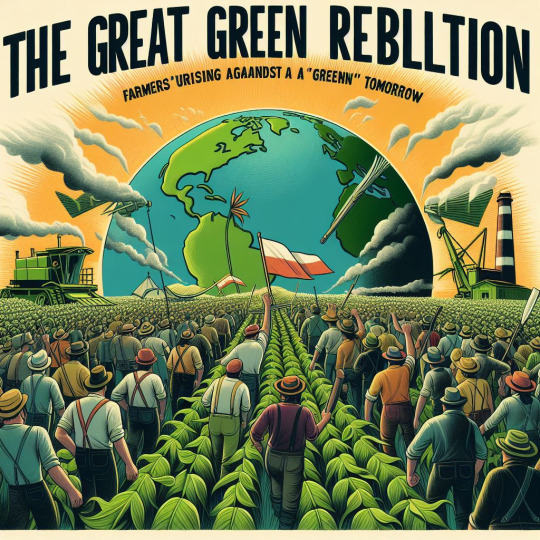
View On WordPress
#2024#Agricultural Policy#Agricultural Unrest#Agriculture Satire#Climate Change#Climate Policy#Dutch Farmers#Environmental Humor#Environmental Legislation#EU Parliament#European Farming#Farmers Protest#Farming Crisis#Farming Humor#France#Germany#Green Rebellion#irony#Manure Protest#Net Zero#Policy Satire#Political-Commentary#Rob Roos#Satire#Tractor Blockade#UN Agenda 2030
2 notes
·
View notes
Text
Apple retrage modelele iPhone 14 și iPhone SE din Europa: impactul legii USB-C și paradoxul încărcătorului
Începând cu 28 decembrie 2024, Apple a retras modelele de bază iPhone 14 și iPhone SE din magazinele oficiale din Uniunea Europeană, pentru a respecta noua legislație privind utilizarea porturilor USB-C pe toate dispozitivele electronice. Această măsură vizează modelele lansate în 2022, inclusiv iPhone 14 Plus și iPhone SE 3, în timp ce modelele Pro au fost deja înlocuite de seria iPhone…
#apple#bam#charger paradox#chargers#Common Charger Directive#deșeuri electronice#diagnosis#diagnoza#e-waste#EU legislation#german#încărcătoare#iPhone 14#iPhone SE#legislație UE#Lightning port#neamt#paradoxul încărcătorului#port Lightning#roman#sustainability#sustenabilitate#tech transition#tranziție tehnologică#usb-c
0 notes
Text
European Union Court's Rulings on Headscarves: A Comprehensive Look at Bans on Burqa, Hijab, and Niqab in Europe and Other Parts of World
European Union Court's Rulings on Headscarves: A Comprehensive Look at Bans on Burqa, Hijab, and Niqab in Europe and Other Parts of World #EUCourt #HeadscarfBan #EuropeanLegislation #GenderEquality #Cultural Norms #Secularism
Embarking on a journey through the diverse landscape of headscarf bans in Europe unveils a complex tapestry of cultural dynamics, legal intricacies, and societal debates. The European Union’s top court, in a series of rulings, has shaped the narrative surrounding the wearing of headscarves, setting precedents that ripple across the continent. From Belgium’s landmark decision in 2011 to the…

View On WordPress
#Cultural Norms#EU Court#European Legislation#Freedom of Expression#Gender Equality#Headscarf Ban#Religious Symbols#Secularism
2 notes
·
View notes
Text
Ok studying some stuff bioethics which is pretty interesting I liked it and I came across the topic of "controversial topic: euthanasia" and clicked the link bc well curious and there are some arguments "for" and "against" it (in brazil euthanasia is considered homicide and thus illegal) and like. Okay. The "against" arguments are pretty stupid ngl:
Ending of life: actively ending of someone's life is technically killing them and killing people is bad (have we forgot the CONTEXT)
Religion: in certain religions like some monotheistic faiths a life ending by any means not fully natural is Bad (if the patient chose it then why do we CARE)
Illegality: it's illegal in certain countries
Are you KIDDING ME
#euthanasia#also just learned that euthanasia comes from the greek eu- (good) and#thanatos (greek god of death) and im like#WOW they rlly cooked with this word didnt they#applause#you see the brazilian legislation is full of crap like that
1 note
·
View note
Text
one of the many problems with bluesky is that i cant strategically search a gossip girl character to get really good references algorithmically shown to me...
#i tried but there was like. three posts and none of them of matt settle serving at premieres. whats the fucking point#i also had to cite eu legislation to them when they fucking restricted my account because i guess#i didn't say hello when first sending a post to my sister#but thats besides the point
1 note
·
View note
Text
According to Harris Tweed themselves, it’s all handwoven in private houses (and according to other sources this is required by law). If that’s true it can’t be machine woven (machinery would be too bulky for a private residence). Any chance you’re thinking of the foot operated treadle looms as machinery or is there other reason to say the manufacturing method has changed?
(In case anyone is wondering the sources confirm they do use a variety of Scottish wool for the tweed.)
Also trademark protections for crafts in the European Union—including fabrics—will have an application process opening up in December next year.
I’m not surprised he didn’t know because, while the legislation was proposed in 2020, there was not a lot of media or professional coverage until November 2023, weeks after it passed. Hopefully, it finally puts to bed a contentious European discussion about “how and when to protect crafts”.
(I only know about the GICI rollout because I have been trying to research this topic since 2021 because a bunch of hinky things are going on around European craft conventions and consumerism.)
The answer to "What the h*ck goes on on those islands to the North and West of mainland Scotland?" by Derek Guy @/dieworkwear on twitter [x]





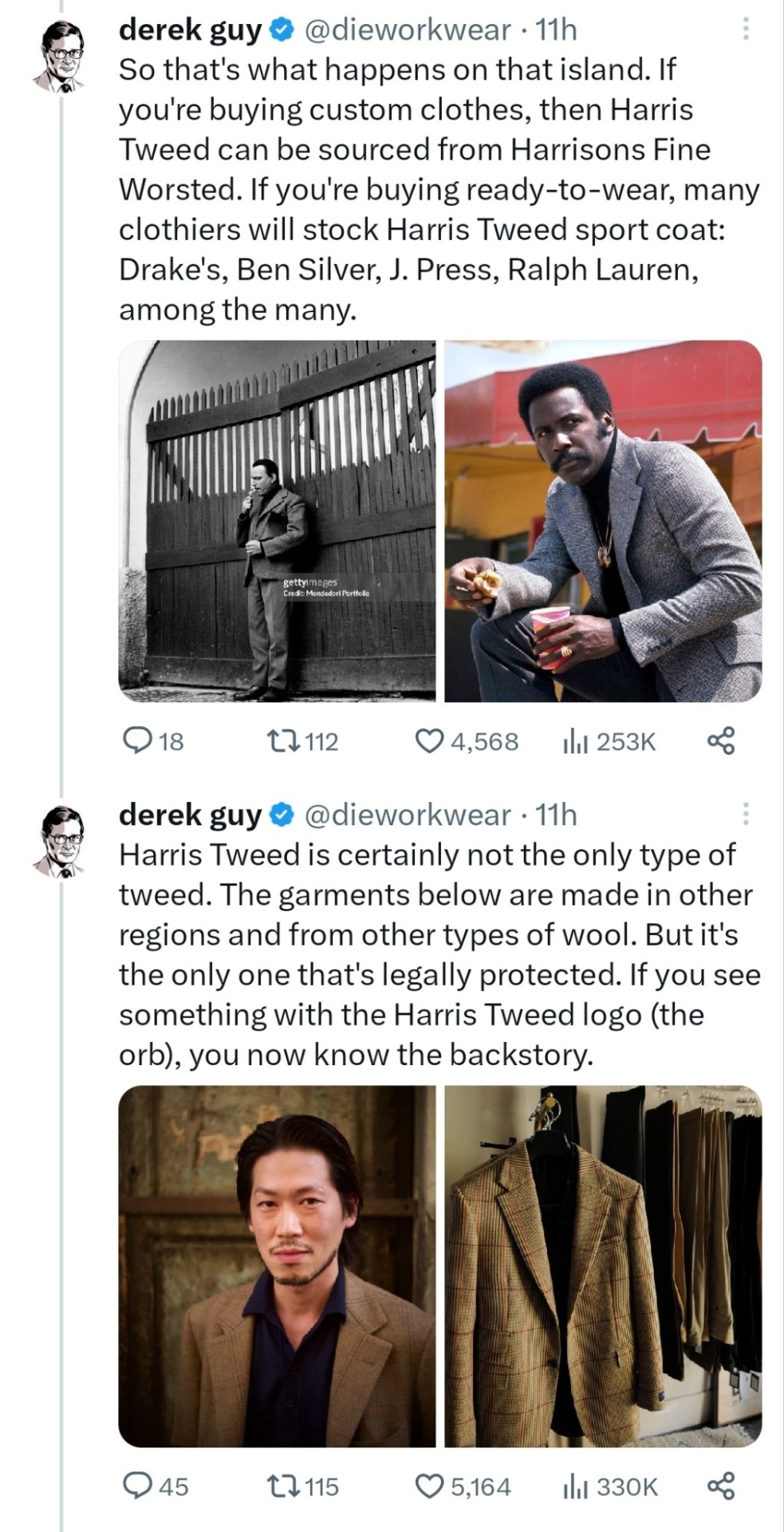
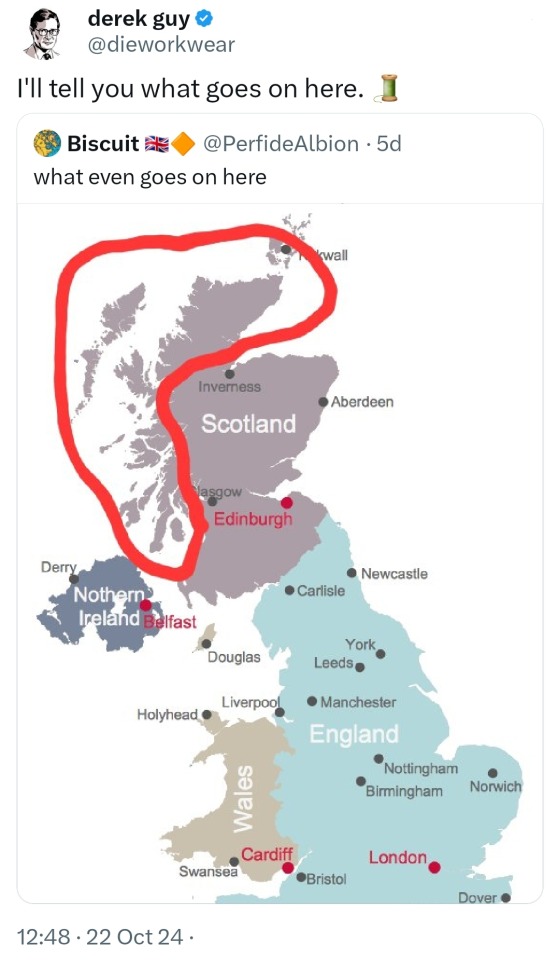
#fashion#correcting information#fiber arts#before 2023 anyone with interest in fiber arts would look up the state of legal protections for craft in the EU and be… taken aback#like everyone was arguing what the legal protections should look like and who they should protect#no sign that the CIGI was on the horizon#(fabrics and crafts are important cultural and industrial heritage in many many European countries)#however currently basically haute couture is a protected term#but only because fashion houses have the money and clout to self-regulate and enforce regulations#like the haute couture system is independent whether it should be or not because the government did not choose to do it#and unfortunately when they were established there weren’t many trades left that had the money desire independence and support#to do the same#(although it had previously been tried with several different types of lace and more)#also let me clarify: no sign to the casual observer that CIGI was on the way#I imagine if people somehow became familiar with the legislation it was easier to follow its process of passing#also I literally spent time researching these tags because I want to try as much as possible to avoid those kinds of ‘#‘could have looked it up’ mistakes#anyway this is why I say I am desperate to have people include sources#asking in good faith because sometimes crafts do change manufacturing processes without… letting anyone know#but given it’s overseen by specific laws and regulations I do think there needs to be a source or something of them not handweaving it#source picture interview etc
26K notes
·
View notes
Text
Latest AI Regulatory Developments:
As artificial intelligence (AI) continues to transform industries, governments worldwide are responding with evolving regulatory frameworks. These regulatory advancements are shaping how businesses integrate and leverage AI technologies. Understanding these changes and preparing for them is crucial to remain compliant and competitive. Recent Developments in AI Regulation: United Kingdom: The…
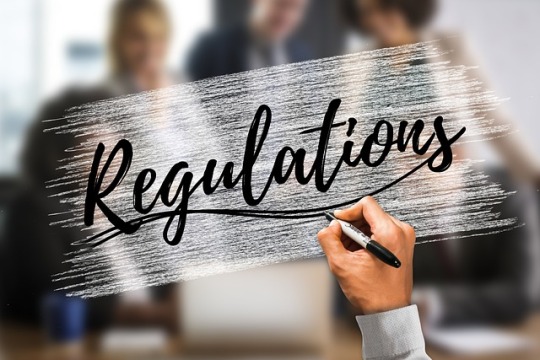
View On WordPress
#AI#AI compliance#AI data governance#AI democratic values#AI enforcement#AI ethics#AI for humanity#AI global norms#AI human rights#AI industry standards#AI innovation#AI legislation#AI penalties#AI principles#AI regulation#AI regulatory framework#AI risk classes#AI risk management#AI safety#AI Safety Summit 2023#AI sector-specific guidance#AI transparency requirements#artificial intelligence#artificial intelligence developments#Bletchley Declaration#ChatGPT#China generative AI regulation#Department for Science Innovation and Technology#EU Artificial Intelligence Act#G7 Hiroshima AI Process
1 note
·
View note
Text
Here's the top 2 stories from each of Fix The News's six categories:

1. A game-changing HIV drug was the biggest story of 2024
In what Science called the 'breakthrough of the year', researchers revealed in June that a twice-yearly drug called lenacapavir reduced HIV infections in a trial in Africa to zero—an astonishing 100% efficacy, and the closest thing to a vaccine in four decades of research. Things moved quick; by October, the maker of the drug, Gilead, had agreed to produce an affordable version for 120 resource-limited countries, and by December trials were underway for a version that could prevent infection with just a single shot per year. 'I got cold shivers. After all our years of sadness, particularly over vaccines, this truly is surreal.'
2. Another incredible year for disease elimination
Jordan became the first country to eliminate leprosy, Chad eliminated sleeping sickness, Guinea eliminated maternal and neonatal tetanus, Belize, Jamaica, and Saint Vincent & the Grenadines eliminated mother-to-child transmission of HIV and syphilis, India achieved the WHO target for eliminating black fever, India, Viet Nam and Pakistan eliminated trachoma, the world’s leading infectious cause of blindness, and Brazil and Timor Leste eliminated elephantiasis.
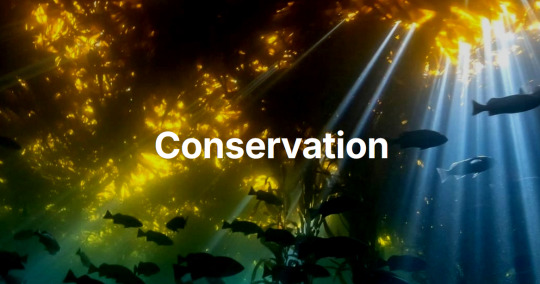
15. The EU passed a landmark nature restoration law
When countries pass environmental legislation, it’s big news; when an entire continent mandates the protection of nature, it signals a profound shift. Under the new law, which passed on a knife-edge vote in June 2024, all 27 member states are legally required to restore at least 20% of land and sea by 2030, and degraded ecosystems by 2050. This is one of the world’s most ambitious pieces of legislation and it didn’t come easy; but the payoff will be huge - from tackling biodiversity loss and climate change to enhancing food security.
16. Deforestation in the Amazon halved in two years
Brazil’s space agency, INPE, confirmed a second consecutive year of declining deforestation in the Brazilian Amazon. That means deforestation rates have roughly halved under Lula, and are now approaching all time lows. In Colombia, deforestation dropped by 36%, hitting a 23-year low. Bolivia created four new protected areas, a huge new new state park was created in Pará to protect some of the oldest and tallest tree species in the tropical Americas and a new study revealed that more of the Amazon is protected than we originally thought, with 62.4% of the rainforest now under some form of conservation management.
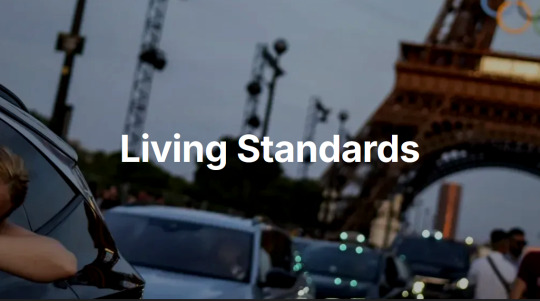
39. Millions more children got an education
Staggering statistics incoming: between 2000 and 2023, the number of children and adolescents not attending school fell by nearly 40%, and Eastern and Southern Africa, achieved gender parity in primary education, with 25 million more girls are enrolled in primary school today than in the early 2000s. Since 2015, an additional 110 million children have entered school worldwide, and 40 million more young people are completing secondary school.
40. We fed around a quarter of the world's kids at school
Around 480 million students are now getting fed at school, up from 319 million before the pandemic, and 104 countries have joined a global coalition to promote school meals, School feeding policies are now in place in 48 countries in Africa, and this year Nigeria announced plans to expand school meals to 20 million children by 2025, Kenya committed to expanding its program from two million to ten million children by the end of the decade, and Indonesia pledged to provide lunches to all 78 million of its students, in what will be the world's largest free school meals program.

50. Solar installations shattered all records
Global solar installations look set to reach an unprecedented 660GW in 2024, up 50% from 2023's previous record. The pace of deployment has become almost unfathomable - in 2010, it took a month to install a gigawatt, by 2016, a week, and in 2024, just 12 hours. Solar has become not just the cheapest form of new electricity in history, but the fastest-growing energy technology ever deployed, and the International Energy Agency said that the pace of deployment is now ahead of the trajectory required for net zero by 2050.
51. Battery storage transformed the economics of renewables
Global battery storage capacity surged 76% in 2024, making investments in solar and wind energy much more attractive, and vice-versa. As with solar, the pace of change stunned even the most cynical observers. Price wars between the big Chinese manufacturers pushed battery costs to record lows, and global battery manufacturing capacity increased by 42%, setting the stage for future growth in both grid storage and electric vehicles - crucial for the clean flexibility required by a renewables-dominated electricity system. The world's first large-scale grid battery installation only went online seven years ago; by next year, global battery storage capacity will exceed that of pumped hydro.
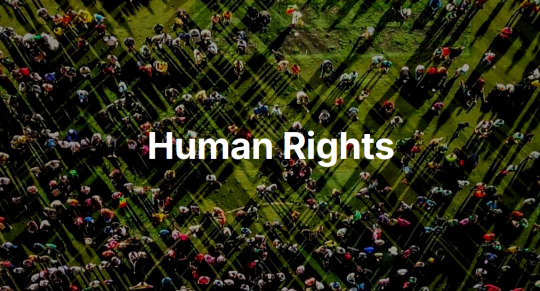
65. Democracy proved remarkably resilient in a record year of elections
More than two billion people went to the polls this year, and democracy fared far better than most people expected, with solid voter turnout, limited election manipulation, and evidence of incumbent governments being tamed. It wasn't all good news, but Indonesia saw the world's biggest one day election, Indian voters rejected authoritarianism, South Korea's democratic institutions did the same, Bangladesh promised free and fair elections following a 'people's victory', Senegal, Sri Lanka and Botswana saw peaceful transfers of power to new leaders after decades of single party rule, and Syria saw the end of one of the world's most horrific authoritarian regimes.
66. Global leaders committed to ending violence against children
In early November, while the eyes of the world were on the US election, an event took place that may prove to be a far more consequential for humanity. Five countries pledged to end corporal punishment in all settings, two more pledged to end it in schools, and another 12, including Bangladesh and Nigeria, accepted recommendations earlier in the year to end corporal punishment of children in all settings. In total, in 2024 more than 100 countries made some kind of commitment to ending violence against children. Together, these countries are home to hundreds of millions of children, with the WHO calling the move a 'fundamental shift.'

73. Space exploration hit new milestones
NASA’s Europa Clipper began a 2.9 billion kilometre voyage to Jupiter to investigate a moon that may have conditions for life; astronomers identified an ice world with a possible atmosphere in the habitable zone; and the James Webb Telescope found the farthest known galaxy. Closer to Earth, China landed on the far side of the moon, the Polaris Dawn crew made a historic trip to orbit, and Starship moved closer to operational use – and maybe one day, to travel to Mars.
74. Next-generation materials advanced
A mind-boggling year for material science. Artificial intelligence helped identify a solid-state electrolyte that could slash lithium use in batteries by 70%, and an Apple supplier announced a battery material that can deliver around 100 times better energy density. Researchers created an insulating synthetic sapphire material 1.25 nanometers thick, plus the world’s thinnest lens, just three atoms across. The world’s first functioning graphene-based semiconductor was unveiled (the long-awaited ‘wonder material’ may finally be coming of age!) and a team at Berkeley invented a fluffy yellow powder that could be a game changer for removing carbon from the atmosphere.
-via Fix The News, December 19, 2024
#renumbered this to reflect the article numbering#and highlight just how many stories of hope there are#and how many successes each labeled story contains#2024#good news#hope#hope posting#hopeposting#hopepunk#conservation#sustainability#public health#energy#quality of life#human rights#science and technology
3K notes
·
View notes